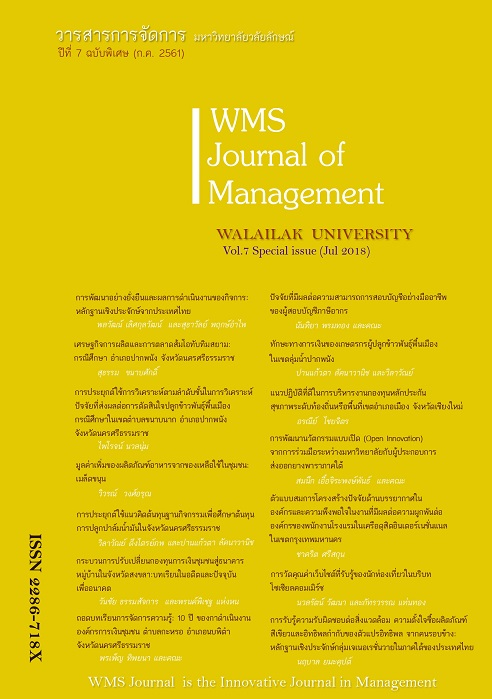The Process of Transforming the Community Fund into a Village Bank in Songkhla Province: Past and Present Lessons for the Future
Main Article Content
Abstract
This research aims to study the modification process, empowerment and the barriers to the transformation of the community fund to the village bank. The conducting of research divided into two phase: Phase 1, 6-step interview: target area, study documentation, select key informants, training research assistant, interview and data analysis. Phase 2, 4-step group process: defining issues of discussion, training research assistant, coordination and group discussion. The data was then analyzed and presented in a descriptive manner. The study found the psychological empowerment contributes to the process of transforming the community finance: 1) the process of transforming the community finance into a village bank. It consists of four administrative factors, namely: people, capital, office and management. Each factor has three stages: preparation, implementation and monitoring. If one of the factors is unbalanced, it leads to failure. 2) the role of psychological empowerment is divided into four dimensions: meaningfulness, competence, self-determination and impact influent to the 5 steps of change: co-planning, co-operation, change, sharing and adaptation, and 3) obstacles encountered in the four administrative factors are lack of participation of some members, liquidity, confined space and no clear plan for action, but problem solving through trial and error is a good teacher. It reflects that the strengthened village bank was born of a village bank that introduced the past to present improvements to a better future.
Article Details
References
Carson, D. et al. (2002). Qualitative marketing research. London: SAGE Publications.
Fawcett SB., Paine-Andrews A., Fancisco VT., Schultz JA., Richter KP., Berkley-Patton J., et al. (1995). Evaluating community initiatives for health and development. In: Rootman I., McQueen D. (editors). Evaluating health promotion approaches. Copenhagen, Denmark: World Health Organization, 241-277.
Kongjaroen, M. and Rattana-ubon, A. (2011). “Development of a community Empowerment model to promote the sustainability of learning communities”. SDU Research Journal Humanities and Social Sciences. 7(2), 19-36.
Managul, T. (2016). Report: Community finance is local security. [in Thai]. Retrieved September 14, 2016, from http://v-reform.org/v-report/community-finance-is-security/
Pratanchawano, P. (2011). Community fund development policy and role of community development officer. [in Thai]. Retrieved September 6, 2011, from http://www.cdd.go.th/ArticlesCommunity Development.php
Ratchapolsit, A. (2017). Dynamics of the saving groups for production network and the operation of Songkhla community financial markets. A thesis for the degree of Master of Arts in Human and Social Development. Songkhla: Prince of Songkla University.
Sereerat, S. et al. (2007). Management and Organizational Behavior. Bangkok: Teera Film and Cites.
Spreitzer, G.M. (1995). “Psychological empowerment in the workplace: Dimentions, measurement, and validation”. Academy of Management Journal. 38, 1442-1465.
Smith J.A. (2003). Qualitative Psychology: A Practical Guide to Research Methods. London: SAGE Publications.
Thomas, K.W. and Velthouse, B.A. (1990). “Cognitive elements of empowerment: An “Integrative” model of intrinsic task motivation”. Academy of Management Review. 15(4), 666-681.


